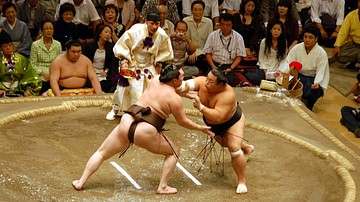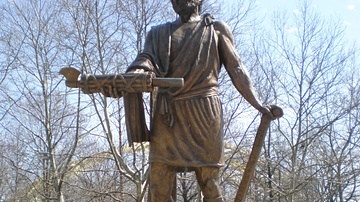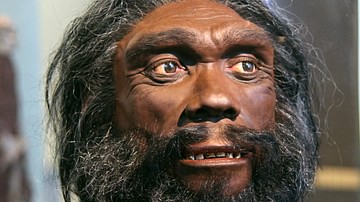Search Definitions
Browse Content (p. 207)

Definition
Sumo - Japan's Ancient Form of Wrestling
Sumo (Ozumo) is an ancient form of wrestling which has long been the national sport of Japan. Its origins go back to the Yayoi period (c. 300 BCE - c. 300 CE) and it incorporates many elements of the Shinto religion in its various rituals...

Definition
Ise Grand Shrine
The Ise Grand Shrine or Ise Jingu, located in the heart of a sacred forest in the Mie Prefecture of Japan, is the most important Shinto shrine in the country and is dedicated to the sun goddess Amaterasu with a separate shrine dedicated to...

Definition
The Westcar Papyrus
The ancient Egyptians enjoyed storytelling as one of their favorite pastimes. Inscriptions and images, as well as the number of stories produced, give evidence of a long history of the art of the story in Egypt dealing with subjects ranging...

Definition
Cincinnatus
Lucius Quinctius Cincinnatus was a Roman consul (460 BCE) and dictator (458 and 439 BCE), a legendary figure in the early days of the Roman Republic. He responded to a call from the city fathers, left his plow lying in the fields, donned...

Definition
Kami
In the Shinto religion kami is an all-embracing term which signifies gods, spirits, deified mortals, ancestors, natural phenomena, and supernatural powers. All of these kami can influence people's everyday lives and so they are worshipped...

Definition
Shinto
Shinto means 'way of the gods' and it is the oldest religion in Japan. Shinto's key concepts include purity, harmony, family respect, and subordination of the individual before the group. The faith has no founder or prophets and there is...

Definition
Nitocris
Nitocris (2184-2181 BCE) is the Greek name for Nitiqret, the last monarch of the 6th Dynasty of Egypt which concluded the period of the Old Kingdom (c. 2613-2181 BCE). Nitocris is best known from the story told of her by Herodotus (484-425/413...

Definition
Tonatiuh
Tonatiuh, 'Turquoise Lord,' was the 5th and present sun in the Aztec view of the cosmos and the fierce sun god of several other Postclassic Mesoamerican cultures, including the Toltecs. It was thought that only the regular offering of hearts...

Definition
Mixcoatl
Mixcoatl, 'Cloud Serpent,' was a Mesoamerican god identified with hunting, the Milky Way and the stars and heavens in general. The god may originally have derived from a deified hunter and warrior-leader of the Toltec-Chichimec peoples of...

Definition
Homo Heidelbergensis
Homo heidelbergensis is an extinct species of human that is identified in both Africa and western Eurasia from roughly 700,000 years ago onwards until around 200,000 years ago – fitting snugly within the Middle Pleistocene. Named for a piece...